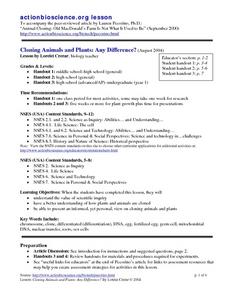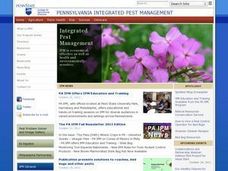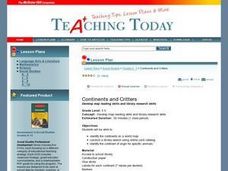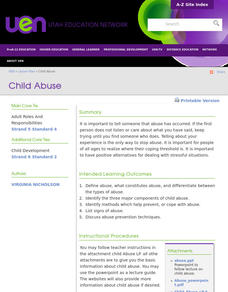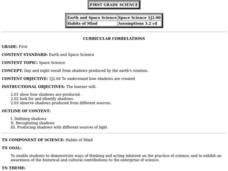Curated OER
Persuasive Text: Vocabulary Charades
Learners play charades to act out vocabulary words that have recently been introduced in class. For this vocabulary lesson students may work in groups or in pairs.
Curated OER
Cloning Animals and Plants: Any Difference?
Students examine the process in which plants and animals are cloned. They compare and contrast the two procedures and determine if there is a difference. They share their views on cloning to the class.
Curated OER
Invertebrates
Young scholars identify the characteristics common to all animals. In groups, they compare the characteristics between the animals and how they are divided. To end the lesson, they compare the eight phyla of invertebrates and review...
Curated OER
Health Grade 1
First graders explore tattling. In this lesson about when to tell and when to not tell, 1st graders determine the difference between tattling and reporting. Students read the book The Tattle Tail Tale or Tattlin' Madeline, by Carol...
Curated OER
Bats -- Pests or Pals?
Fourth graders examine a bat and determine if it is a pest or pal. They identify three types of bats native to the state of Pennsylvania. They also identify the parts of a bat and write a report on the bat of their choice.
Curated OER
Wildlife Study Comparison
Pupils compare/contrast two studies that examine the effects of environmental contaminants on animals. They read an article, identify the components of a research study, summarize the article, and complete a matrix.
Curated OER
Simple Machines
Third graders examine and identify the six types of simple machines. Using a model of each simple machine, they demonstrate the state the function of them to the class. They discover examples of simple machines at school and home and...
Curated OER
Continents and Critters
Students investigate and identify the continents of the world. They identify and locate the seven continents on a map, and label a coloring page of a world map. Students then conduct research on an assigned continent, and write and...
Curated OER
Proper Nouns and Capitalization
Sixth graders brainstorm and write common nouns beginning with a given letter, then using one word from the list write as many proper nouns for that word, correctly capitalized. In this proper nouns and capitalization lesson, 6th...
Curated OER
It's Your Birthday! Expository Writing Unit 2
Students create an expository essay. In this writing instructional activity Students are assigned a country and must conduct research surrounding a historic event that occurred in that country at the time of their birth.
Curated OER
Movie Poster: Persuasive Text
Students create movie posters based upon short stories they've recently read. In this persuasive writing lesson students analyze a poster that is intended to persuade people to want to see the movie and convince Steven...
Curated OER
Research/Technical Writing: Paraphrasing
Pupils work in groups to paraphrase an article. In this paraphrasing lesson, each group is assigned a paragraph to paraphrase in one sentence. Other groups critique the sentences to make sure each is effective. ...
Curated OER
Where I'm From: Imitative Poem
Students analyze 'Where I'm From' by George Ella Lyon. In this poetry lesson plan students examine the content and structure of the poem and mimic it to create a similar poem of their own.
Curated OER
Child Abuse
Students define abuse, and identify the three major components of child abuse. They identify methods that help prevent, or cope with abuse, and prevention techniques.
Curated OER
The Periodic Table of Elements
Eleventh graders study the use of the periodic table to develop a better understanding of the chemical elements.
Curated OER
Day And Night
First graders examine how the earth experiences day and night by using a flashlight and a globe as a model.
Curated OER
Earth's History
Seventh graders study the law of superposition by creating models of fossils in layers of rock. They examine how fossils are usually found in sedimentary rock which leads to the study of geologic history in those rocks.
Curated OER
Ancient Man in Asia
Seventh graders analyze and synthesize information about major historical developments by interpreting data, evaluation sources of information, identifying and comparing experiences and perspectives from multiple cultural perspectives.
Curated OER
Establishing a Point of View in Narratives
Fourth graders investigate the concept and take the opportunity to both identify and to construct point of view in narratives. Additionally, 4th graders practice identifying and sequencing main events.
Curated OER
Diversity and Adaptation
Tenth graders explore structure, function and variation among species. Through field observations, lab activities and homework, 10th graders observe and record examples of adaptation and variation.
Curated OER
What's My Point?
Sixth graders move through the process of defining persuasion, identifying persuasive arguments and techniques in writing and evaluating their own use of accurate details. Students also define an author's point of view.
Curated OER
Hierarchical Organization in Biology: Students Presentations of Neurobiology
Students gather (research) information on neuron structure and action potential. Students are guided to make inferences about the synapse and its relationship to neurotransmitter release and action. They are also guided to make...
Curated OER
Day and Night
First graders study that day and night result from shadows produced by Earth's rotation. Students work to show how shadows are produced, look for and identify shadows and observe shadows produced from different sources.
Curated OER
Understanding Science Vocabulary And Categorization
Students explore and examine scientific language and categorization as related to commonly known plants and animals. They hypothesize about a specific plant or animal, how it was scientifically named, what concepts and vocabulary is...

